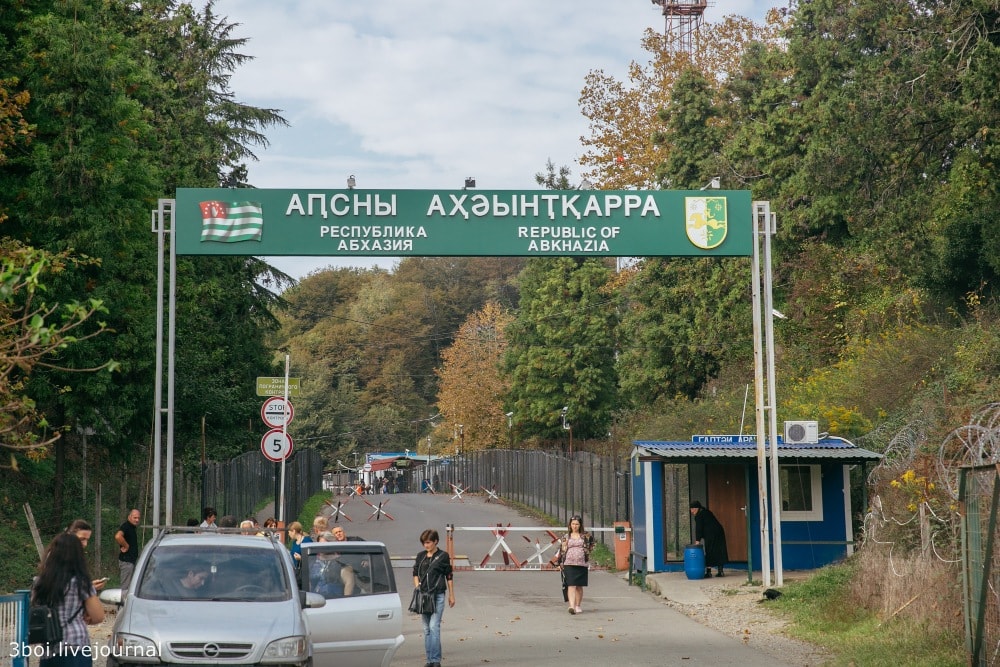
GALI, DFWatch–The pandemic has caused an extremely difficult situation for tens of thousands of Gali residents whose livelihood depends on commuting to Georgia proper.
The restrictions to halt the spread of Covid-19 have exacerbated the situation for locals here in Gali, a mostly ethnic Georgian area of Abkhazia, where residents are already suffering under the policies of the Sokhumi regime, which denies them basic liberties.
Traveling to “mainland” Georgia was problematic even before the Covid-19 outbreak, but now it’s a real challenge here. People have to resort to illegal crossings to reach neighboring Zugdidi municipality, on Georgian-controlled territory, in order to obtain pensions and social benefits, and to meet their loved ones.
These crossings involve bypassing Russian and Abkhazian checkpoint and wading across the Enguri river, which is expensive on the one hand, because you have to pay 100-150 GEL for guides, and on the other hand risky – if caught by Russian border guards, people face serious legal problems, and even a prison term, by Abkhaz authorities.
One local tells the story of an elderly man who recently had to make one such informal crossing to Zugdidi and return back the next day in order to embrace his first grandchild, as could not legally do so under Abkhazian law.
“Yesterday, my elderly neighbor waded through the water [Enguri River] to see his granddaughter. The baby is 7 months old and he had not seen her. Of course, it’s risky, but what can people do? Families are torn apart. It’s his first grandchild and he could not bear missing her,” a 27-year-old woman from the village of Tagiloni told DFWatch.
Sukhumi closed the only crossing on the Enguri bridge in February, after the first case of the new coronavirus was detected on the territory of Georgia. The humanitarian corridor has been opened to Gali residents only a few times since February, and for a certain category of people. The only exceptions are people with health problems and Covid-19 patients.
“The Georgian population of Gali depends entirely on Zugdidi, be it for trade, healthcare or other necessities. We have not had the practice of closing the road for so long, so the situation has gotten worse and worse. If you do not travel [to Zugdidi], you will not be able to get medical care or access to social programs,” said a 32-year-old woman from the village of Sida in the Gali district.
In Gali, goods sold in markets and stores are far more expensive than across the administrative borderline, in the settlements controlled by Georgian authorities, hence commuting between Gali and Zugdidi is essential for locals to make ends meet.
Being able to commute is especially important in August and September, during the hazelnut harvest, which is the main source of income for locals. Since Gali farmers are currently not able to sell their harvest in Zugdidi, they have to sell it locally instead, for cheaper prices.
“You have to sell hazelnuts here for 3 or even 4 GEL less [than in Zugdidi]. You can sell it on the wholesale market in Zugdidi for 8 GEL [per kg], here you can get not more than 5 GEL. The price of course varies, though there is a difference of about 3 GEL. What can people do? They have no other income, so they sell at the price that the Gali market offers,” said a 55-year-old resident of the village of Saberio.
This situation has triggered an increase in illegal crossings. Even before the pandemic, locals actively used such paths to avoid relentless Russian border guards and corrupt Abkhaz customs officials. However, after Sokhumi actually isolated the region from the rest of Georgia, these crossings have become absolutely essential.
“To hire a guide costs 100-150 GEL for each person,” said a 27-year-old girl from the village of Tagiloni. “This is a risky business which is associated with many dangers, and sometimes ends fatally. Earlier people used these paths time-by-time but recently the demand has drastically risen.”

